The president of El Salvador, Nayib Bukele, declared on Sunday that “we can fix” the ongoing political turmoil and rampant gang violence in Haiti, equating the images of brutality from the island nation to the state of affairs in his home country before implementing a law enforcement crackdown in 2022.
Bukele did not specify who the “we” in his sentence was — whether he meant the government of El Salvador or the international community in general. He later commented that “experts” had declared similar violence in El Salvador “intrinsic” to the country, and the eradication of organized criminal violence from the country had proven them wrong.
El Salvador suffered decades of near-total control of society by organized criminal gangs, most prominently Mara Salvatrucha (MS-13) and the 18th Street gang. Bukele, who took office in 2019, greatly expanded police authority and, in 2022, enacted a “state of exception” that allowed police to detain tens of thousands of gang suspects. Bukele also built “mega-prison” complexes to house the suspects and is processing the criminals in mass trials to facilitate their removal from society.
WATCH — Law and Order: El Salvador Builds “Mega Prison” to Eradicate Gangs
Presidency of the Republic of El Salvador via StoryfulBukele’s dramatic expansion of law enforcement powers has alarmed outside observers, who fear that regular citizens may soon see their constitutional rights eroded as well. Yet no reports have surfaced from El Salvador of the imprisoning of political dissidents or silencing of opposition. The country’s most prominent opposition newspaper, El Faro, conceded in 2023 that “gangs do not exist” in the country as they used to, allowing citizens to enact basic liberties such as visiting their public parks in peace and establishing small businesses without paying the gangs extortion fees. El Faro continues to operate and freely publish materials critical of Bukele.
Bukele was overwhelmingly reelected in February’s presidential election with an estimated 85 percent of the vote.
Haiti has suffered years of organized criminal violence, extreme poverty, political corruption, and unrest. The situation spiraled out of control in 2021, when assassins shot President Jovenel Moise dead in his home, apparently part of an elaborate plot in which even his wife, Martine Moise, was indicted in February. Haiti has not had a president since.
The only acting authority in the aftermath of the assassination was Prime Minister Ariel Henry, appointed to the post days before Moise’s killing. Henry has repeatedly refused to hold elections or step down from the prime ministership, contending that it was not possible to hold a free and fair election in Haiti due to violence and infrastructure decay. Responding to international pressure, he most recently promised to organize an election by August 2025.
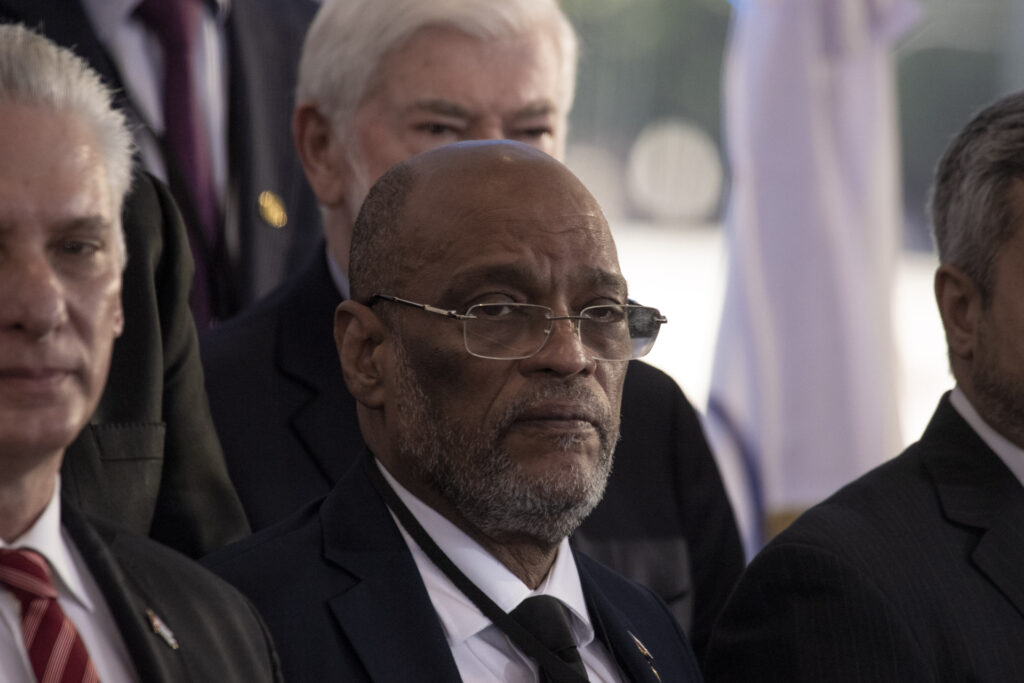
Ariel Henry (Anita Pouchard Serra/Bloomberg via Getty Images)
Henry left Haiti seeking support for the creation of an international police force that would deploy to fight growing violence by criminal gangs. Haiti’s police force, depleted by a lack of resources and easy access to the American immigration system, is not currently in a state to pose a threat to the gangs. Henry traveled to Kenya, whose President William Ruto offered to lead a law enforcement operation in the country but has faced harsh criticisms and accusations of violating the constitution at home, where an intervention in Haiti is unpopular.
In Henry’s absence, Haiti’s most powerful gang leader, Jimmy “Barbecue” Cherizier, orchestrated a siege of the country’s prisons, releasing an estimated 4,000 inmates and demanding Henry resign. Gang members have flooded the streets of the capital, taking over government buildings, roads, and the local airport, making it impossible for Henry to return home. Henry is currently believed to be in Puerto Rico, where reports claim the government of President Joe Biden is attempting to encourage him to resign.
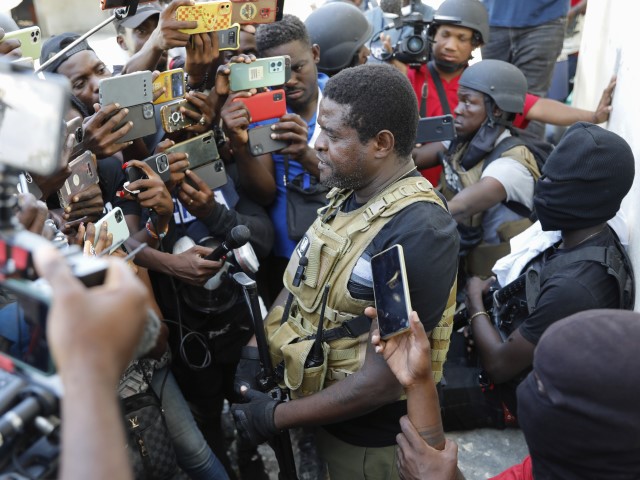
Jimmy Cherizier, a former elite police officer known as Barbecue who now runs a gang federation, holds a press conference in the Delmas 6 neighborhood of Port-au-Prince, Haiti, on March 5, 2024. (Odelyn Joseph/AP)
“The battle will last as long as it needs to. We will keep fighting Ariel Henry. To avoid collateral damage, keep the kids at home,” Cherizier warned on television.
“The Haitian people must be liberated. We will do it with our weapons. All the armed groups in the country, in the provinces and in Port-au-Prince, are more united than ever. We, the armed men, have decided to take the future into our own hands,” he declared.
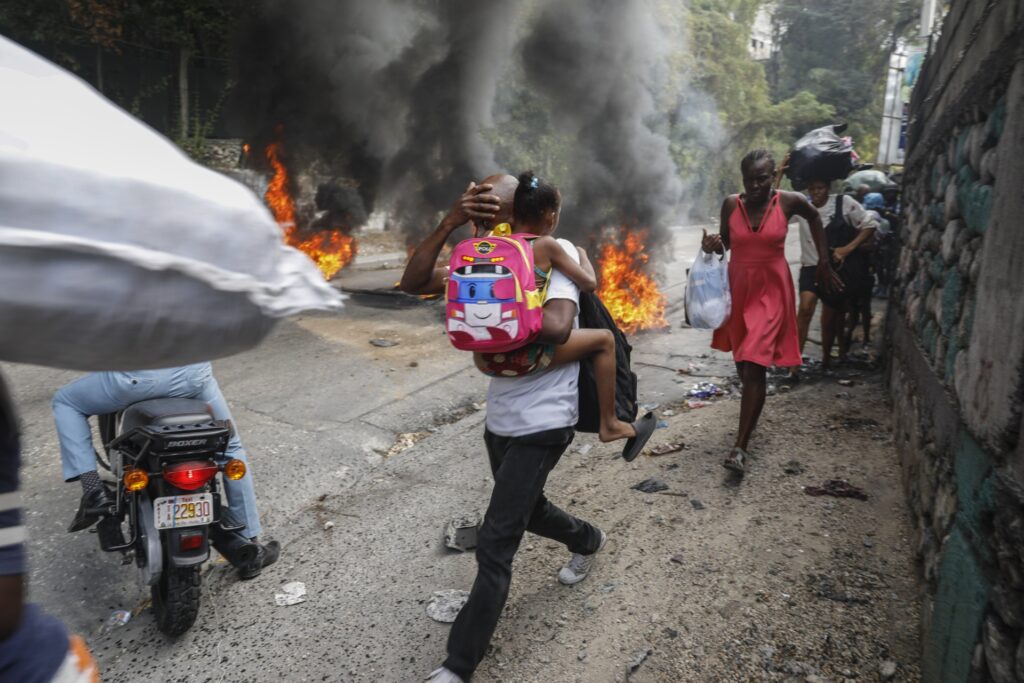
People walk past burning tires during a protest against Haitian Prime Minister Ariel Henry in Port-au-Prince, Haiti, on February 5, 2024. (AP Photo/Odelyn Joseph)
Cherizier later threatened to facilitate a “genocide” if Henry remained in power. Multiple foreign governments, including that of the United States, began evacuating embassy staff, leaving Cherizier the most powerful person in the country.
“We can fix it,” Bukele, from El Salvador, offered on Sunday. “But we’ll need a UNSC [U.N. Security Council] resolution, the consent of the host country, and all the mission expenses to be covered.”
We can fix it.
But we’ll need a UNSC resolution, the consent of the host country, and all the mission expenses to be covered. https://t.co/GPqMVo7MTN
— Nayib Bukele (@nayibbukele) March 10, 2024
Bukele later shared unconfirmed images allegedly of gang members engaging in cannibalism in Haiti, adding, “We saw similar images in El Salvador a few years ago. Gangs bathing with the skulls of their victims.”
We saw similar images in El Salvador a few years ago. Gangs bathing with the skulls of their victims.
All the “experts” said they couldn’t be defeated, because they were an “intrinsic part of our society”.
They were wrong.
We obliterated them.
The same must be done in Haiti. https://t.co/RkrBfZuGGM
— Nayib Bukele (@nayibbukele) March 11, 2024
The gruesome undated videos circulating appeared to show a man eating what seemed to be a finger and carving what appeared to be a human leg. The Indian newspaper Hindustan Times claimed in a report on Monday that “the video is two years old and has nothing to do with the current unrest.” The origin of the video remains unconfirmed; it is unclear if it was filmed in Haiti.
While unusual, cannibalism is not unheard of in the culture of Western Hemisphere gangs. In 2017, inmates involved in a prison riot in Brazil filmed themselves apparently grilling the bodies of members of a rival gang. Individuals claiming to belong to one of Brazil’s most powerful gangs, the Red Command (CV), boasted that they were cooking “PCC skirt steak,” referring to the rival First Capital Command (PCC). In Venezuela, the families of victims reportedly killed, cooked, and eaten in western Táchira accused the socialist government in 2016 of allowing a prisoner, Dorancel “The People-Eater” Vargas, to butcher fellow inmates and feed them to other prisoners.
The U.N. Security Council has made no significant moves to ease the situation in Haiti. On Monday, the council published a lengthy statement expressing “concern” about the lawlessness and hoping the Kenya-led police initiative gets off the ground eventually.
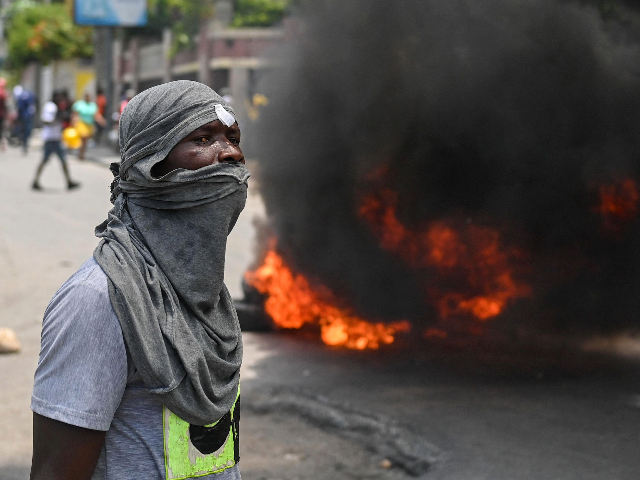
A man stands near a burning tire during a demonstration against insecurity in Carrefour-Feuilles, a district of Port-au-Prince, Haiti, on August 14, 2023. (RICHARD PIERRIN/AFP via Getty Images)
“Members of the Council heard Kenya’s briefing on the ongoing planning efforts on the deployment of the Multinational Security Support mission to Haiti and the international pledges made to the mission,” the statement read. “They expressed the expectation and hope for the deployment of the Multinational Security Support mission to Haiti as soon as possible, as requested by Haiti and authorized by the Security Council through resolution 2699 (2023).”
In an interview with ABC News, Cherizier reiterated his demand for Henry to resign on Monday but claimed the gangs would expand their war after that happens.
“The first step is to overthrow Ariel Henry and then we will start the real fight against the current system, the system of corrupt oligarchs and corrupt traditional politicians,” the gang boss reportedly said. “Not only are we fighting against Ariel Henry, but we are also fighting against everyone who has some complicity.”
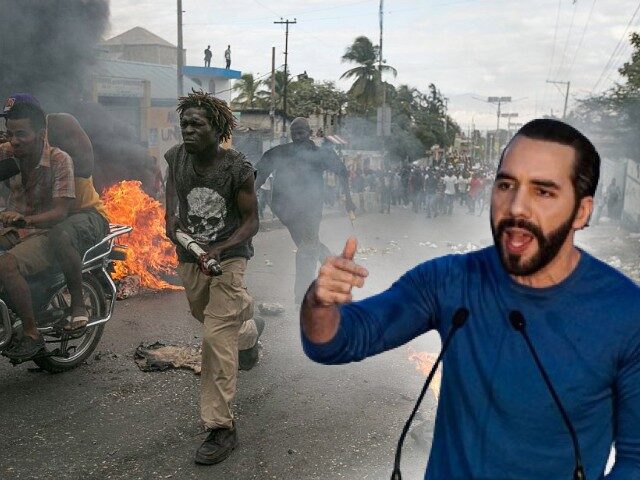
COMMENTS
Please let us know if you're having issues with commenting.